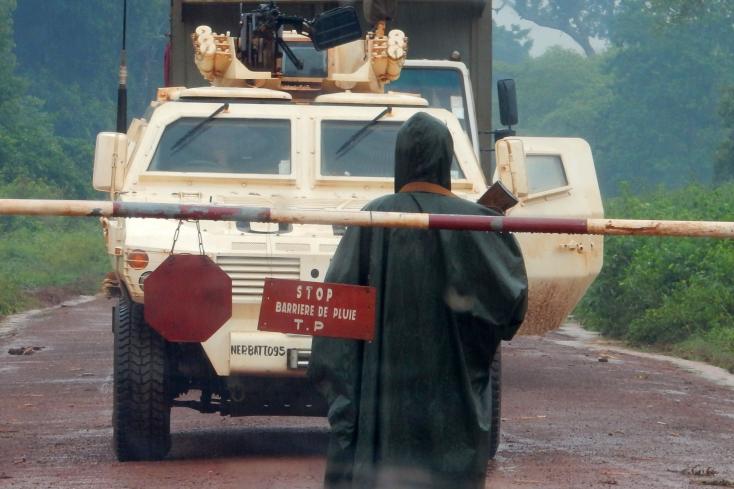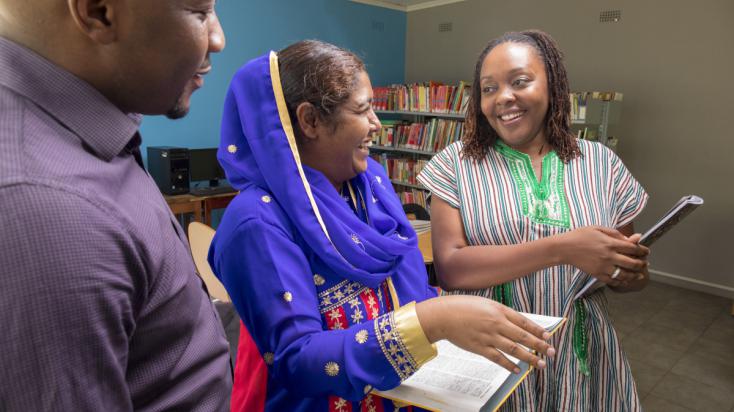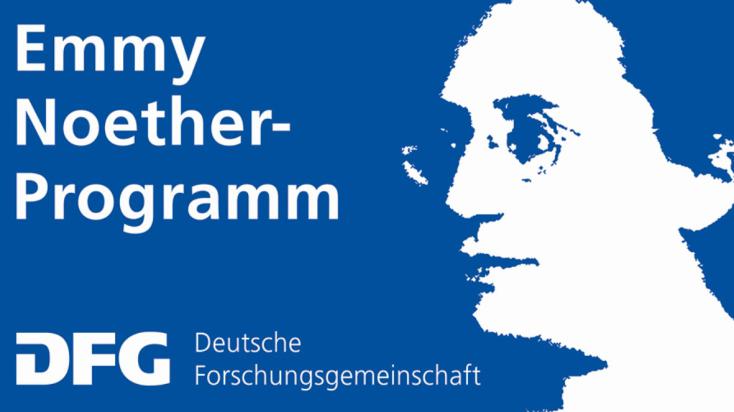original ) (raw )
The ABI is one of Germany’s major research centers in the domain of both comparative area studies and transregional studies. As an independent, non-profit research institution, the institute cooperates with the University of Freiburg. The Institute was founded in 1960 and goes back to Arnold Bergstraesser, at that time Professor of Political Science and Sociology at the University of Freiburg.
more
more
more
A frica, L atin America, M iddle East, and A sia (ALMA) that ABI staff and associates have particularly enjoyed reading. With this blog we aim to start new conversations, explore interesting themes and topics as well as highlight excellent scholarship. The blog language is in English, a new review is published once a month.
more
 12.11.2024 Alke Jenss in ILA on Mexico Alke Jenss shares her expertise on the economic policy strategies in Mexico under the presidency of Andrés Manuel Lopéz Obrador in the newest issue of ILA.
12.11.2024 Alke Jenss in ILA on Mexico Alke Jenss shares her expertise on the economic policy strategies in Mexico under the presidency of Andrés Manuel Lopéz Obrador in the newest issue of ILA.  12.11.2024 "De/Coloniality Now" initiative funds ABI-research Viviana Viviana García Pinzón & Tim Glawion receive funding for collaborative research with partners in the Global South.
12.11.2024 "De/Coloniality Now" initiative funds ABI-research Viviana Viviana García Pinzón & Tim Glawion receive funding for collaborative research with partners in the Global South.  07.11.2024 ABI expertise in civic education Viviana García Pinzón, Helga Dickow and Tim Glawion share their diverse expertise for conflict portraits on El Salvador, Chad, the Central African Republic, South Sudan and Haiti.
07.11.2024 ABI expertise in civic education Viviana García Pinzón, Helga Dickow and Tim Glawion share their diverse expertise for conflict portraits on El Salvador, Chad, the Central African Republic, South Sudan and Haiti.  06.11.2024 New episode of the podcast "Confronting Hierarchies" The project Postcolonial Hierarchies has released the 3rd episode of their podcast series “Confronting Hierarchies – A Podcast on (De)Coloniality, Peace & Conflict”. This episode hosts Prof. Swati Parashar and Dr. Amya Agarwal.
06.11.2024 New episode of the podcast "Confronting Hierarchies" The project Postcolonial Hierarchies has released the 3rd episode of their podcast series “Confronting Hierarchies – A Podcast on (De)Coloniality, Peace & Conflict”. This episode hosts Prof. Swati Parashar and Dr. Amya Agarwal.  Burundi-Symposium: Opportunities and Challenges Celebrating the 40th anniversary of the partnership between Burundi and Baden-Württemberg, ACT and ABI hold a scientific symposium titled “Burundi in East Africa: Opportunities and challenges”. When?18.11.2024 - 00:00 — 19.11.2024 - 00:00
Burundi-Symposium: Opportunities and Challenges Celebrating the 40th anniversary of the partnership between Burundi and Baden-Württemberg, ACT and ABI hold a scientific symposium titled “Burundi in East Africa: Opportunities and challenges”. When?18.11.2024 - 00:00 — 19.11.2024 - 00:00  Event on Global Partnerships The event offers speeches and a panel discussion on the opportunities and challenges of global partnerships on the occasion of the 40th anniversary of the partnership between Baden-Württemberg and Burundi. Who? Nadyne Saint-Cast Member of Local Parliament, State Secretary Rudi Hoogvliet Where?Haus zur Lieben Hand, Löwenstraße 16, 79098 Freiburg When?18.11.2024 - 16:30 — 18.11.2024 - 19:30
Event on Global Partnerships The event offers speeches and a panel discussion on the opportunities and challenges of global partnerships on the occasion of the 40th anniversary of the partnership between Baden-Württemberg and Burundi. Who? Nadyne Saint-Cast Member of Local Parliament, State Secretary Rudi Hoogvliet Where?Haus zur Lieben Hand, Löwenstraße 16, 79098 Freiburg When?18.11.2024 - 16:30 — 18.11.2024 - 19:30  Africa Talk on Restitution Richard Tsogang Fossi and Fiona Siegenthaler share inside knowledge on ongoing processes and discussions regarding the restitution of cultural goods and human remains. Who?Dr. Richard Tsogang Fossi, Dr. Fiona Siegenthaler Where?University of Freiburg, KGI, HS 1098 When?27.11.2024 - 20:00
Africa Talk on Restitution Richard Tsogang Fossi and Fiona Siegenthaler share inside knowledge on ongoing processes and discussions regarding the restitution of cultural goods and human remains. Who?Dr. Richard Tsogang Fossi, Dr. Fiona Siegenthaler Where?University of Freiburg, KGI, HS 1098 When?27.11.2024 - 20:00  Africa Talk on Conflict and Critical Minerals in Africa Dr. Collins Chikodili Ajibo shares his expertise on the interactions between conflict, rule of law, and the governance of mineral resources in Africa. Who?Dr. Collins Chikodili Ajibo Where?University of Freiburg, KGI, HS 1098 When?22.01.2025 - 20:00
Africa Talk on Conflict and Critical Minerals in Africa Dr. Collins Chikodili Ajibo shares his expertise on the interactions between conflict, rule of law, and the governance of mineral resources in Africa. Who?Dr. Collins Chikodili Ajibo Where?University of Freiburg, KGI, HS 1098 When?22.01.2025 - 20:00  Restitution Governance – Current Status and the Way Forward Mehler, Prof. Dr. Andreas ABI Working Paper
Restitution Governance – Current Status and the Way Forward Mehler, Prof. Dr. Andreas ABI Working Paper  Risks of Morocco's green hydrogen plans Schütze, Dr. Benjamin with Hussein, Dr. Hussam SCIENCE Date of publication: 31.10.2024
Risks of Morocco's green hydrogen plans Schütze, Dr. Benjamin with Hussein, Dr. Hussam SCIENCE Date of publication: 31.10.2024  State-led gentrification against the backdrop of Urban Authoritarian Practices: Introduction Fanton Ribeiro da Silva, Dr. Hugo / Jenss, Dr. Alke with Can, Dr. Aysegül International Journal of Urban and Regional Research Date of publication: 18.10.2024
State-led gentrification against the backdrop of Urban Authoritarian Practices: Introduction Fanton Ribeiro da Silva, Dr. Hugo / Jenss, Dr. Alke with Can, Dr. Aysegül International Journal of Urban and Regional Research Date of publication: 18.10.2024  Blog: ALMA Reviews This blog series aims to discuss, highlight, and engage with scholarship from the regions of Africa, Latin America, Middle East, and Asia (ALMA) that ABI staff and associates have particularly enjoyed reading. With this blog we aim to start new conversations, explore interesting themes and topics as well as highlight excellent scholarship. The blog language is in English, a new review is published once a month.
Blog: ALMA Reviews This blog series aims to discuss, highlight, and engage with scholarship from the regions of Africa, Latin America, Middle East, and Asia (ALMA) that ABI staff and associates have particularly enjoyed reading. With this blog we aim to start new conversations, explore interesting themes and topics as well as highlight excellent scholarship. The blog language is in English, a new review is published once a month.  Junior Research Group “Renewable Energies, Renewed Authoritarianisms? The Political Economy of Solar Energy in the Middle East and North Africa (MENA)” Emmy Noether Junior Research Group looks at the relationship between solar energy and authoritarian practices in select countries of the Middle East and North Africa (MENA), namely in Morocco, Tunisia and Jordan. 2022 - 2028 Contested Governance
Junior Research Group “Renewable Energies, Renewed Authoritarianisms? The Political Economy of Solar Energy in the Middle East and North Africa (MENA)” Emmy Noether Junior Research Group looks at the relationship between solar energy and authoritarian practices in select countries of the Middle East and North Africa (MENA), namely in Morocco, Tunisia and Jordan. 2022 - 2028 Contested Governance  Project: Paradoxes of security In a research project funded by the DFG, Tim Glawion examines why attempts by so-called fragile states to monopolize the use of violence sometimes result in different objective and subjective levels of security. 2020 - 2025
Project: Paradoxes of security In a research project funded by the DFG, Tim Glawion examines why attempts by so-called fragile states to monopolize the use of violence sometimes result in different objective and subjective levels of security. 2020 - 2025